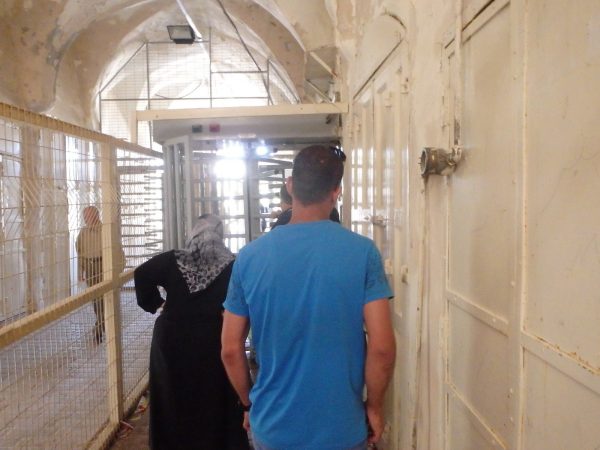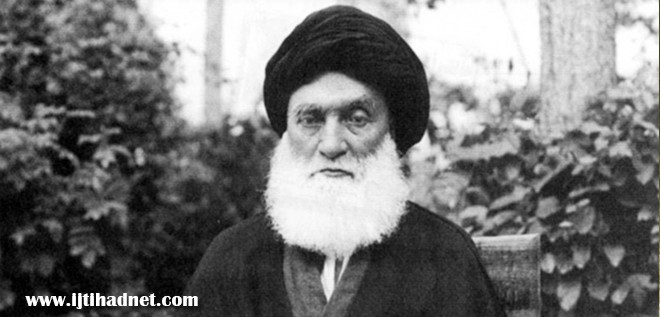BIOGRAPHY OF LATE AYATOLLAH BORUJERDI
Sayyid Hussain Tabatabaii Borujerdi, popularly known as Haaj Agha Hussain Borujerdi, son of Sayyid Ali, was bo in the year 1292 A.H. (Lunar) in Borujerd, and passed away in the moing of Thursday, 12th Shawwal 1380 A.H./Lunar (10th Farvardin 1340 A.H./Solar) in Qum. He was a famous Faqeeh (Shi’ite Jurisprudent) and a great Marja’ (Chief Religious Authority) of the 14th century Hegira.
EDUCATION:
Ayatollah Borujerdi had his primary education in Borujerd. He then attended Noorbakhsh seminary in Borujerd where he completed his preliminary and intermediate Islamic education. From the year 1310 A.H. he pursued further the leaing of Islamic sciences, including philosophy, in the city of Isfahan. In 1319 he attained the status of Ijtihad (competence for inference of Islamic decrees and precepts) at the age of 28 when he retued to his hometown, Borujerd. In 1320 A.H. he went to the holy city of Najaf, and completed his education by the year 1328.
HIS TEACHERS:
He was taught religious sciences in Isfahan by great religious teachers like Sayyid Muhammad Baaqir Durcheyi, Mirza Abul-Maali Kalbasi, Sayyid Muhammad Taqi Mudarris and Sayyid Abul-Qasim Dehkordi. In Najaf, his teachers included Akhund Khorasani, Sayyid Muhammad Kazem Yazdi and Sheikh Shariat Isfahani. He was taught philosophy by renowned teachers such as Mullah Muhammad Kashi and Hakim Jahangir Khan Qashqaii in Isfahan as well.
HIS TRAVELS:
After completing his education in Najaf, Ayatollah Borujerdi retued to Borujerd in 1328 and took his residence there for several years. After years of residence in Borujerd, he traveled and lectured in different places. Wherever he went, he was graciously welcomed by local dignitaries and Ulema who requested him to hold teaching and discussion sessions. His travels are detailed below:
– Travel to Mashad in 1340, where he stayed for several months
– Travel to Qum on his way back from Mashad; his sojou in these two cities lasted 1.5 years.
– Haj Pilgrimage in 1345; this travel was made through Iraq, where he stayed for four months in Najaf. There he was welcomed by distinguished Ulema including Grand Ayatollahs Mirzaye Naiini, Sayyid Abul-Hasan Isfahani, Agha Dhiyauddin Iraqi, and Sheikh Muhammad Hussain Isfahani. While retuing from Haj and upon his arrival at the Iranian border with Iraq, he was arrested and taken to Tehran for the reason of participation in a gathering of Ulema in Najaf against Reza Shah (the incumbent king of Iran).
– After his release from detention he stayed in Tehran for nearly three months before proceeding to Mashad. After a stay of seven months in Mashad he retued to Borujerd.
– Towards the end of the year 1363 A.H./Lunar (1323 A.H./Solar) he traveled to Tehran for medical treatments. He was hospitalized in Firoozabadi Hospital in Shahre-Rey for nearly two months. After his discharge from the hospital in early 1364 A.H./Lunar (winter of 1323 A.H./Solar), he went to Qum and spent the rest of his life over there.
– Travel to Mashad in the summer of 1324 (A.H./Solar) for a period of three months
INCUMBENCY OF THE POST OF SUPERINTENDENCE OF HAWZAH ILMIYYAH (THEOLOGICAL CENTER) OF QUM, AND ATTAINING THE POSITION OF MARJAIYYAT AAM (CHIEF RELIGIOUS AUTHORITY):
In the winter of 1323 A.H./Solar, after leaving the hospital, Ayatollah Borujerdi arrived in Qum. Upon the request and insist of dignitaries and Ulema of Hawzah Ilmiyyah of Qum, Ayatullah Borujerdi agreed to undertake the overall responsibility for running the Qum Theological Center. At the same time many of the teachers and educators of Hawzah stopped their classes to pay respect to him as the prominent teacher of Hawzah.
Before long, his Muqallideen (followers of his decrees) increased in number. The demise of Ayatollah Sayyid Abul-Hasan Isfahani in 1325 A.H./Solar, and a few months later, demise of Ayatollah Haaj Agha Hussain Qummi, resulted in their Shi’ite followers tuing to Ayatollah Borujerdi as their new Marja’e Taqleed (Source of issuing Islamic Jurisprudential decrees). Thus, the chair of Marjaiyyat Aam (chief religious authority) was taken by Ayatollah Borujerdi.
Ayatollah Borujerdi had already become well known for his erudition, especially in the religious sciences, as evidenced by the acclaim he received in his travels to Mashad, Qum and Najaf.
While leaing at Najaf, he himself taught the book “Al-Fosul” as well. In the branch of science known as ‘Usule Fiqh’ (Principles of Islamic Jurisprudence) he followed the views of Akhund Khorasani; and in his lectures on this subject, he tried to be brief and to make discussions easy and simplified. He was careful about proper understanding of the viewpoints of the past Shiite Jurisprudents whose decrees he collected and examined thoroughly and held in esteem, especially those of Hassan Ibne Abi Aquil Ummani and Muhammad Ibne Junaid Iskafi.
He believed that Traditions, Sayings, and Narrations of Shiite infallible Imams (A.S.) were best understood by referring to the narrations and decrees issued by Sunnite contemporaries of the Imams (A.S.), for in those days Sunnite decrees were prevailing, and even the disciples of the Holy Imams (A.S.) used to ask them their questions according to the decrees of Sunnite people, and the Imams also replied on the same basis. For this very reason, Ayatollah Borujerdi considered that reference to the Sunnite decrees, constituted a part of the prerequisite studies pertaining to Fiqh. He said: “The earlier Shiite Jurisprudents were aware of the opposing views on problems”. He added: “The ancient scholars quoted Sunnite decrees in their books or in their lessons and subjected them to their critical evaluation.” For this reason he initiated printing of Sheikh Tusi’s book entitled “Al-Khilaf” for the first time.
To infer Islamic precepts and decrees, Ayatollah Borujerdi relied more on a careful scrutiny to the Traditions/Narrations than on practicalities. With regard to different narrations which were all cited by a single narrator, Ayatollah Borujerdi juxtaposed them altogether, and most often this juxtaposition resulted in his conclusion that all of them were related to the same original Tradition or source, which had come to be interpreted and assimilated in various ways later by the succeeding narrators.
WRITINGS / COMPILATIONS:
In addition to some monographs written by his students, writings of Ayatollah Borujerdi himself included the following:
1) Jame’ Ahadith Ul-Shia’ (The Comprehensive Book of Shiite Traditions/Narrations)
2) An Encyclopedia that includes an index of narrators, as well as a bibliography of writings on the subjects of ‘Rijal’ and ‘Hadith’(Traditions) along with their documentations
3) Hashiah (Annotations) on the book ‘Urwatul-Wuthqa’
4) Hashiah (Annotations) on Sheikh Tusi’s ‘Khilaf’
5) Sharh (Explanatory Monograph) on the book ‘Kifayatul-Usul’
SERVICES RENDERED BY AYATOLLAH BORUJERDI DURING HIS TENURE AS THE SUPERINTENDENT OF HAWZAH ILMIYYAH OF QUM
During the days of Reza Shah, the Hawzah Ilmiyyah of Qum was weakened. After Ayatollah Borujerdi undertook the administration and management of the seminary, its power was restored.
The institution became self-supporting after the public increasingly reposed their confidence in and allegiance to him as Marja’e Taqleed (their Jurisprudential advisor).
The administrative and educational improvements became evident. For instance, with regard to the matter of collection of Islamic taxes, all cases of appointments of individuals as proxies for this purpose were duly registered. Also all correspondence was recorded.
The number of students, which totaled some two thousand (2000) when Ayatollah Borujerdi took over, had trebled by the time of his death.
Specific improvements in the teaching system were also noticeable. Ayatollah Borujerdi was successful to set up a systematic curriculum in the Hawzah Ilmiyyah. Some teachers were appointed or nominated to be responsible for students’ tests. The students were requested to take the examinations, and their stipend payment was made conditional upon their participation in the exams. This requirement met with some formidable opposition, inasmuch as in Najaf, Ayatollah Istahbanati banned participation in such exams. Although a senior Ayatollah, Sayyid Abdul-Hadi Shirazi, supported the exams required by Ayatollah Borujerdi, due to the intension of oppositions, Ayatollah Borujerdi himself ordered the examination schedule in Najaf to be cancelled.
Ayatollah Borujerdi was interested in good handwriting and correct syntax in writing, to the extent that he wanted to include them in the syllabi for the purpose of the tests.
He encouraged diligent students, and thereby contributed to the growth of leaing level at the seminary.
By publishing magazines like “Lessons From The Islamic School”, he provided opportunity for the accomplished individuals at Hawzah to express their own views and make them known inside the country or beyond the borders of Iran.
Among Ayatollah Borujerdi’s commendable initiatives is that of dispatching missionaries abroad in connection with Islamic propagation and educational activities. One of his envoys was Sheikh Muhaqqiq Rashti who went to Germany and was able to establish a grand, magnificent mosque in Hamburg.
AYATOLLAH BORUJERDI’S VIEWS ON BRINGING ABOUT PROXIMITY AMONG DIFFERENT ISLAMIC SECTS:
Ayatollah Borujerdi was a protagonist of unity and solidarity of the Islamic world and tried to create a kind of proximity among different Muslim sects. In this connection, he corresponded with Dar ul-Taqrib (Center of Proximity) in Cairo and its founders, including Sheikh Abdul-Majid Salim and Sheikh Mahmood Shaltut, the former Rectors of Al-Az’har University. Sheikh Muhammad Taqi Qummi, as the Secretary-General, represented Ayatollah Borujerdi in Dar ul-Taqrib, Cairo.
Continuous communications and contacts of Ayatollah Borujerdi with Dar ul-Taqrib and the Rectors of Al-Az’har University resulted in Sheikh Shaltut’s historic Fatwa (Islamic Decree) conceing attestation of the legitimacy of the “Shiite” sect. It introduced the Shiite Sect as one of the legitimate Islamic Schools of Thought to all Muslims and others in the world.
Ayatollah Borujerdi, was sensitive and averse towards sectarian divisiveness among Muslims, and tried his very best to prevent it. He did not recommend, or justify, any undue focus of attention on the issue of caliphate and its historical account. When dealing with the topic of Imamate, too, he abstained from being engaged in the issue of caliphate. On the contrary, he considered the issue of caliphate as a historical event that is passed, and does not call for a discussion at the present time.
The important matter, he believed, was to identify the sources of “Ahkam” (Islamic decrees and precepts). For this reason, he highlighted the importance of the scientific dimension of Imamate according to what the holy Prophet (S.A.) has stated in the famous ‘Hadith of Thaqalain’.
As mentioned earlier, Ayatollah Borujerdi was arrested and imprisoned once. That was in the year 1306 A.H./Solar when he retued from Haj, and passed – in his route – through the holy city of Najaf.
His visit to Najaf coincided with the group immigration of the Ulema of Isfahan to Qum in protest against the compulsory military service, a law that was approved by the order of Reza Shah. In this connection, a secret session was held at the residence of Ayatollah Mirzaye Naiini wherein a group of Ulema, including Ayatollah Borujerdi, took part.
In that session, it was agreed that Ayatollah Borujerdi, as the proxy of Najaf Grand Ayatollahs, Naiini and Ishafahni, travel to Tehran. Later on the matter was dropped and Ayatollah Borujerdi, too, declined to undertake such a task. Then, Ayatollah Borujerdi stayed on at Najaf for a few months before proceeding to Iran via Qasre Shirin border check post where he was arrested and shifted to Tehran’s ‘Arkan Harb’ garrison, a detention center.
In a short time he was found not guilty and released. His release order was issued by Reza Shah on the occasion of his visit to Borujerd to attend the funeral ceremony of Amir Lashkar Tahmasbi (murdered on 1307 A.H./Solar). It was in that trip that the Tabatabaii Family, which was considered to be very influential in the Lorestan region, requested Reza Shah to liberate the Ayatollah (Tabatabaii) Borujerdi, who belonged to same family.
After his release, Ayatollah Borujerdi met Reza Shah and recommended him to avoid distancing himself form the clergy.
Also, as Ayatollah had closely seen the conditions of the soldiers in ‘Arkan Harb’ garrison, he had told Reza Shah to increase the ration of the soldiers from serving boiled rice once weekly to twice weekly, because they were ‘soldiers of Islam’, and this suggestion was much praised by Reza Shah.
Ayatollah Borujerdi then retued to his hometown, Borujerd, where he stayed on in an isolated manner until the death of Reza Shah due to severe prevailing tyrannical conditions.
When Mohammed Reza Shah succeeded his father, tried to consolidate his royal position and justify his reign by establishing contacts with the religious Ulema, which included a royal visit to the sick Ayahollah Borujerdi in the year 1323 A.H./S in Firoozabadi hospital, Shahre Rey. Ayatollah Borujerdi made some observations, among them he recommended the Shah that there should be no longer any negligence in religions matters.
Earlier, during Reza Shah’s time, when Ayatollah Borujerdi was imprisoned, he had proved that was by no means impressed by the royal might.
Also in the event of Reza Shah’s deposal in the month of Shahrivar, 1320 A.H./Solar, when Ayatollah Qummi had come to Iran, and the Shah’s administration ignored his requests, Ayatollah Borujerdi sent a telegram to Ayatollah Qummi and thereby stated that he was ready to come to Tehran, if necessary. It is said that such a telegram at that time had been one of the factors that influenced the subsequent acceptance by the govement, of Ayatollah Qummi’s requests.
Yet, with all his bold encounters, Ayatollah Borujerdi remained wary of politics, in which he intervened only to the extent necessary. With a lifetime of high-level encounters and experience of various events, he remained careful in exercising his political acumen. Moreover, during the 1320s and 1330s of the Solar Hegira calendar, the activists of the ‘Tudeh’ communist party were making serious efforts in Iran, and at the same time, Iran was under great pressure by foreign govements. Under those circumstances, the Ayatollah considered it rather expedient not to weaken the govement of Shah to an extent more than necessary. Thus, Ayatollah Borujerdi’s opposition to the Shah was not too overt, in that he did reply appropriately to the royal telegrams, and on occasions complied with royal requests for his audience.
Nonetheless, whenever necessary, the Ayatollah did not hesitate to encounter royalty with firmness, and even sometimes by sending threatening messages.
Such opposition was effective in preventing implementation of some of the govemental plans. For instance, in the year 1338 AH/S, Ayatollah Borujerdi effectively opposed the proposed Latinization of the Persian script.
The Ayatollah, furthermore, supported those who were struggling against the Shah, and he was instrumental in nullifying attempts by Shah’s agents to enlist support of the Ulema of Qum against the opposition group of ‘Jibheye Melli’ and ‘Musaddiq (the incumbent Prime Minister)’
SOURCES:
1) MARJAIYYAT DAR ARSEYE IJTIMAA’ WA SIAASAT (i.e. Marjaiyyat In The Arena Of Society And Politics), by Sayyid Muhammad Hussain Manzoorul-Ajdad, Shirazeh Publications, Tehran
2) HAYAT UL-IMAM AL-BORUJERDI (i.e. The Biography of Ayatollah Borujerdi), by Muhammad Wa’ez-zadeh Khorasani, Published by ‘Majmaye Taqrib Madhaheb Islami’, Tehran
English...
ما را در سایت English دنبال می کنید
برچسب : نویسنده : استخدام کار enshagaq بازدید : 302 تاريخ : سه شنبه 29 تير 1395 ساعت: 8:03




















